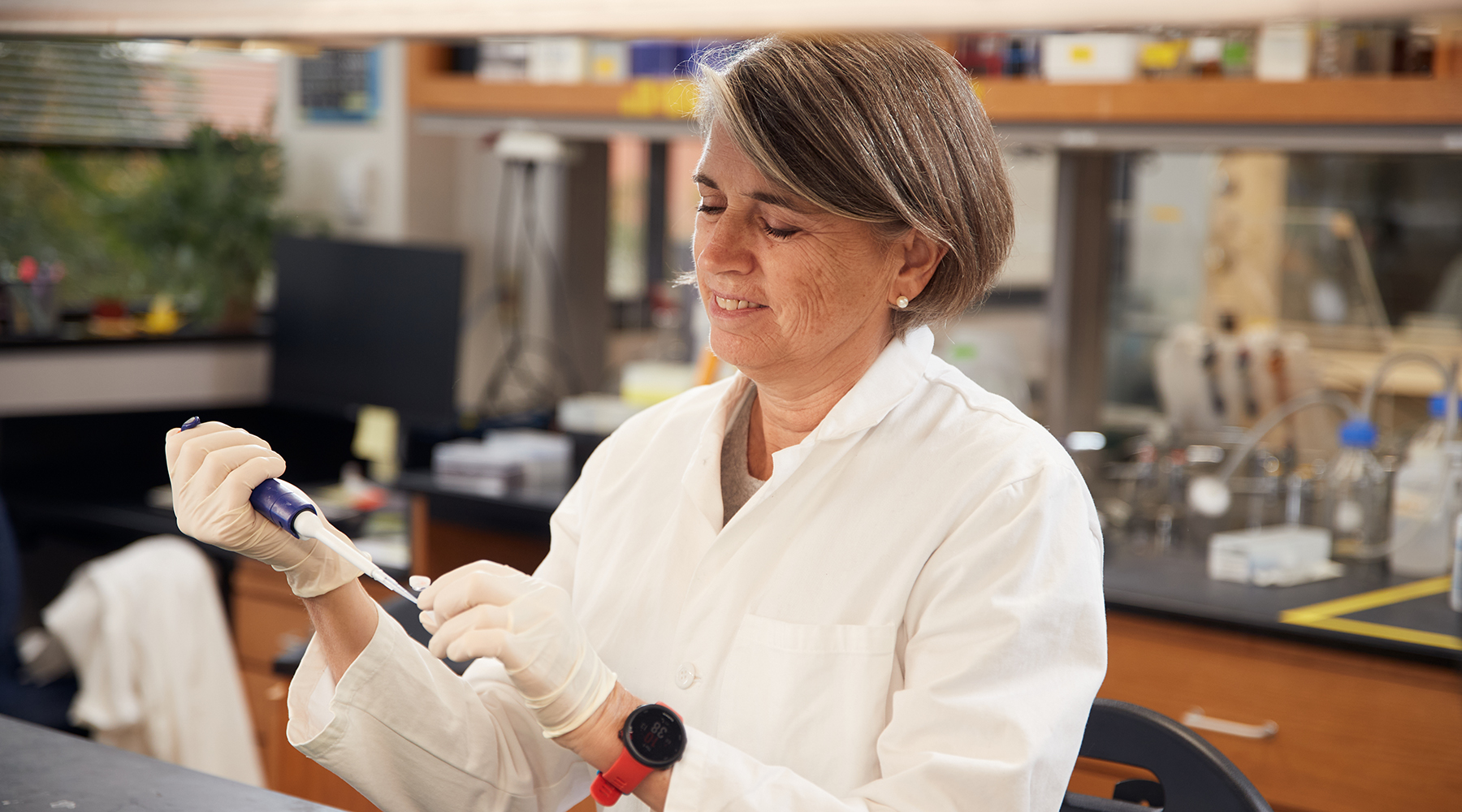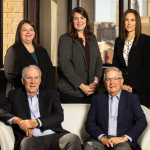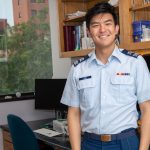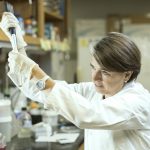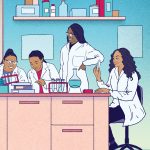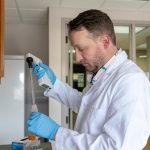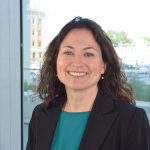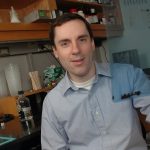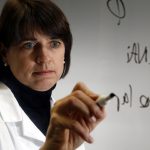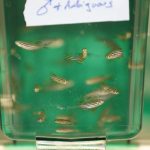Susannah Rankin, Ph.D.
Professor
Cell Cycle & Cancer Biology Research Program
My 101
My lab is interested in how chromosomes, the long DNA molecules that contain all of our genes, are duplicated and packaged during cellular division. When cells divide, either in order to develop new tissues or to replace aging or defective cells, a precise and highly complex series of events must be carefully coordinated to ensure that newly forming cells inherit the appropriate components and function properly. Because chromosomes carry essentially all genetic information within a cell, their accurate segregation during cell division is critical. Indeed, errors in chromosome segregation play an important role in the development of tumors; most cancer cells have an inappropriate number of chromosomes. Our goal is to understand the machinery that ensures proper chromosome duplication, compaction, and inheritance. We use several models and approaches to study chromosome biology, including cultured human cells, biochemical analyses of extracts from frog eggs, and advanced microscopy techniques. Our research is performed by a collaborative team of graduate students, post-doctoral fellows, and exceptional technical staff; we are also frequently assisted by summer interns.
Research
Work in the Rankin lab is focused on understanding the chromosome cohesion apparatus, how it is regulated during cell division, and how aberrant cohesion contributes to disease. Although the essential mechanisms of cohesion are conserved throughout eukaryotic phylogeny, we are particularly interested in the metazoan elaborations of this system. Aberrant cohesion causes developmental defects and is associated with tumor progression.
The cohesin complex was discovered and initially characterized based on its role in tethering newly replicated copies of chromosomes together from the time they are made until cell division. This cohesion ensures accurate chromosome alignment and segregation in mitosis. Sister chromatid cohesion also supports DNA repair mechanisms that rely on homologous recombination.
In higher eukaryotes, cohesin also plays a critical role promoting normal chromosome structure. Cohesin ensures that chromosomes are packaged into loops and domains. This folding both compacts chromosomes and serves to define the transcriptional landscape. Cohesin in this role is thus a critical epigenetic regulator. Cohesinopathies, developmental disorders in individuals with compromised cohesin loading or function, are thought to reflect abnormal gene expression due to changes in chromosome structure.
My interest in cohesin regulation began a number of years ago with my discovery of the essential cohesin regulator Sororin. This activity is not present in fungal systems, which were the basis for our understanding of cohesin regulation at the time. We continue to work on Sororin, and have expanded the scope of study to include other cohesin regulators that are unique to or different in metazoans. We are particularly interested in how chromosome structure can be modulated to respond to DNA damage, to accommodate new transcriptional demands during development, and to promote orderly gene rearrangements in specific cells and tissues.
Brief CV
Education
B.A., Reed College, Portland, OR, 1985
Ph.D., Tufts University School of Medicine, Boston, MA, 1995
Honors and Awards
Mortimer Sackler Scholar, Tufts University, 1993-1994
Post-doctoral Fellow, Jane Coffin Childs Fund for Biomedical Research, 1995-1998
Post-doctoral Fellow, Charles A. King Trust Medical Foundation, 1998-2000
Pew Foundation Scholar in Biomedical Research, 2008
Fred Jones Award for Scientific Achievement, 2020
Joined OMRF scientific staff in 2006
Publications
Recent Publications
Jawor M, Tchorz K, Ostoja-Helczynski M, Rankin S, Kirkland J. Altered Cohesin Dynamics During Cellular Differentiation. bioRxiv, 2026 January, PMID: 41509300, PMCID: PMC12776299
Rankin BD, Rankin S. The MCM2-7 Complex: Roles beyond DNA Unwinding. Biology (Basel) 13, 2024 April, PMID: 38666870, PMCID: PMC11048021
Schoen JR, Chen J, Rankin S. The intrinsically disordered tail of ESCO1 binds DNA in a charge-dependent manner. bioRxiv, 2023 December, PMID: 38106185, PMCID: PMC10723360
Selected Publications
Sansam CG, Pietrzak K, Majchrzycka B, Kerlin MA, Chen J, Rankin S, Sansam CL. A mechanism for epigenetic control of DNA replication. Genes Dev. 2018 Feb 26; 32:224-9. PMID: 29483155, PMCID: PMC5859964
Alomer RM, da Silva EML, Chen J, Piekarz KM, McDonald K, Sansam CG, Sansam CL, Rankin S. Esco1 and Esco2 regulate distinct cohesin functions during cell cycle progression. Proc Natl Acad Sci USA. 2017 Sep 12;114(37):9906-11. PMID: 28847955, PMCID: PMC5604028
Rankin S. Complex elaboration: making sense of meiotic cohesin dynamics. FEBS J. 2015 Jul;282(13):2426-43. doi: 10.1111/febs.13301. Epub 2015 May 9. Review. PMID: 25895170, PMCID: PMC4490075.
Song J, Lafont A, Chen J, Wu F, Shirahige K, Rankin S. Cohesin Acetylation Promotes Sister Chromatid Cohesion Only in Association with the Replication Machinery. Journal of Biological Chemistry. 2012 October; 287(41):34325-34336. doi: 10.1074/jbc.M112.400192. PMID: 22896698, PMCID: PMC3464539
Lafont AL, Song J, Rankin S. Sororin cooperates with the acetyltransferase Eco2 to ensure DNA replication-dependent sister chromatid cohesion. Proc Natl Acad Sci U S A 107:20364-20369, 2010. PMID: 21059905, PMCID: PMC2996691
Rankin S, Ayad NG, Kirschner MW. Sororin, a substrate of the anaphase-promoting complex, is required for sister chromatid cohesion in vertebrates. Mol Cell 18:185-200, 2005. PMID: 15837422
Contact
Cell Cycle and Cancer Biology Research Program, MS 48
Oklahoma Medical Research Foundation
825 N.E. 13th Street
Oklahoma City, OK 73104
Phone: (405) 271-8190
Fax: (405) 271-7312
E-mail: Susannah-Rankin@omrf.org
For media inquiries, please contact OMRF’s Office of Public Affairs at news@omrf.org.
Lab Staff
Sourabh Shenoy
Research Trainee
Brooke Rankin
Graduate Student
Jeffery Schoen
Graduate Student
Jase Daugherty
Administrative Assistant III
Denna Mills
Administrative Assistant III
News from the Rankin lab
OMRF scientist Susannah Rankin, Ph.D., has been named the state’s first ever Pew Scholar. After a nationwide competition, Rankin, a cell biologist at OMRF, was named Thursday as 1 of 20 2008 Pew Scholars in Biomedical Research by the Pew Charitable Trusts and the University of California at San Francisco. The honor includes a $240,000 […]
Four scientists from some of the nation’s leading research institutions have joined the faculty of the Oklahoma Medical Research Foundation. The new researchers bring additional strength to OMRF’s research in cancer, genetic disorders and immunology. Susannah Rankin, Ph.D., and Dean Dawson, Ph.D., come to OMRF from Boston, where Rankin studied cell division in the Systems […]
